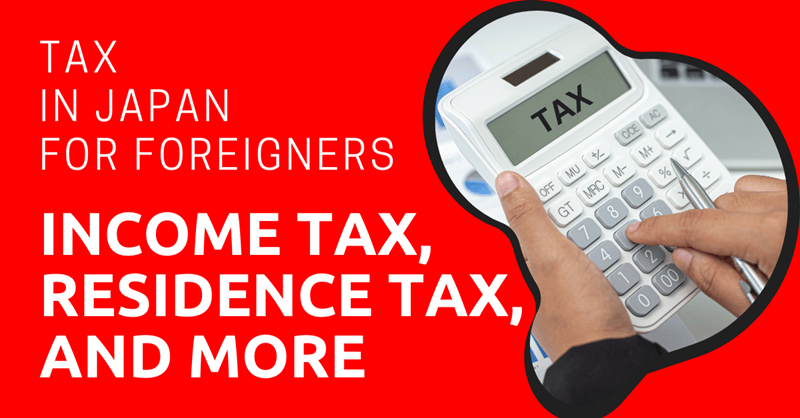
Living and earning an income in Japan comes with the expected duty of having to pay taxes.
Like all Japanese citizens (with the exclusion of those receiving some kind of social welfare services), all expats, regardless of nationality, must pay the appropriate taxes to the Japanese government by March 15th every year.
American expats, in particular, have specific tax laws and circumstantial legal exceptions, which I will discuss in detail in this article.
My main aim, however, is to provide some broad guidelines for reporting your taxes, so that you don’t run into any trouble while living in Japan.
Most of the information here are things that I didn’t know when I first arrived, and had to learn by trial-and-error after years of being here. Keep in mind that taxes have also changed quite a bit over the years, and they’ll likely be subject to change in the future.
It’s worth noting that Japan has an extensive list of taxes, both anticipated and unforeseen, surpassing those found in many other countries. It pays to be aware of this list so you can navigate the Japanese tax system effectively.
In this article, I will include the different tax categories, the processes involved in reporting taxes, and a special section that applies only to American expats.
This article will take approximately 22 minutes to read. Don't have the time right now? No worries. You can email the ad-free version of the article to yourself and read it later!
Disclaimer: This article may include links to products or services offered by ExpatDen’s partners, which give us commissions when you click on them. Although this may influence how they appear in the text, we only recommend solutions that we would use in your situation. Read more in our Advertising Disclosure.
Contents
- Resident and Nonresident Tax Status
- My Number Card: Your Individual Tax Identification Number
- The Main Types of Taxes in Japan
- Tax Deductions from Your Taxable Income (Shotoku-kōjo)
- Dealing with Income from Abroad
- Reporting Your Income
- When to Report Your Tax
- How to Report Your Taxes Each Year
- Furusato Nozei: Why Not Get Amazing Freebies for Paying Taxes!
- Tips for American Expats Living in Japan
- Now, on to You
Resident and Nonresident Tax Status
Your initial tax status is partly determined by the duration of your residence in Japan.
For example, someone who has lived in Japan for a year or more is subject to a different tax reporting process.
There are three resident statuses in Japan: non-resident, non-permanent resident, and permanent resident. While the terminology can be confusing, the key factor that makes a difference is the length of time you spend here.
Non-resident
If you live in Japan for less than one year, your tax status will be non-resident.
This means you are liable only for income that you earn in Japan, or domestic income taxes.
Non-permanent resident
A non-permanent resident is a foreign expat who has resided in Japan for at least a year but less than five years in the last decade.
As a non-permanent resident, you are required to pay taxes on worldwide income that is ‘remitted to Japan’.
Permanent resident
A permanent resident refers to a Japanese national or a foreign expat who has maintained residence in Japan for at least five out of the previous 10 years.
My Number Card: Your Individual Tax Identification Number
The ‘My Number Card’ is an individual number card system assigned to all residents in Japan.
The government enforced the use of this card in 2015, and it was first distributed as a paper card with a number sent to residents by mail.
The government’s decision to issue this card stems from the idea that all Japanese individuals would, in theory, opt for a plastic, hard-copy version featuring their photo on it, similar to a driving license.
This card could be used for getting healthcare services, streamlining the tax process, obtaining necessary official paperwork, and a variety of other functions.
However, while the assigned unique 12-digit number is mandatory, and you are automatically enrolled in the system, trading your paper card for a plastic all-in-one identification card is 100% voluntary.
Actually, many Japanese people who originally received the paper version of the card have refused to create a plastic card due to a fear of security and privacy issues.
The government has implemented incentive programs to encourage people to choose the plastic identification card. However, it’s not mandatory to create one, although you are required to keep the 12-digit number accessible for various paperwork).
The Main Types of Taxes in Japan
Let’s take a look at all the important types of taxes in Japan that foreigners should be aware of.
Juminzei (Residence Tax)
If you reside in Japan, you are obligated to pay the resident tax, and the rate is generally uniform regardless of your location in the country.

This tax is typically 10% of what you earned in the previous year, consisting of a 4% prefectural tax and a 6% municipal tax.
During your first year in Japan, your company may not deduct this tax from your salary but will do it thereafter.
Resident taxes are generally used to fund infrastructures, local services, and most public services that you will be using.
Pay close attention to your monthly pay stub, and make sure that your company is deducting these taxes properly.
If you plan to leave Japan to return to your home country in the middle of the year, you may be required to pay the remainder of your residence tax in one lump sum at the local government office. This will also be required if you change jobs mid-year.
You need to check with your company’s accounting and payroll department to make sure that your tax status is up to date.
You can find a more detailed explanation of the resident tax here.
Shotokuzei (Personal Income Tax) Scale
Similar to many other countries, Japan structures its taxes on a progressive scale — the more money you earn, the higher the taxes you pay.
The current national income tax scale rates range from 5% for earnings less than 1,950,000 JPY to 45% for earnings over 40,000,000 JPY.
You can refer to this income bracket chart to determine the category you fall into.
- 0-1,950,000 JPY: 5%
- 1,950,001-3,300,000 JPY: 10%
- 3,300,001-6,950,000 JPY: 20%
- 6,950,001-9,000,000 JPY: 23%
- 9,000,001-18,000,000 JPY: 33%
- 18,000,001-40,000,000 JPY: 40%
- 40,000,000+ JPY: 45%
Additionally, since 2013, Japan has implemented a surtax, a 2.1% tax levied in addition to your income tax. The measure was introduced in response to the Tohoku earthquake disaster and is anticipated to remain in effect until 2037.
Nenkin (Mandatory Pension Fund)
The Nenkin system is Japan’s mandatory pension plan, consisting of two components: a national pension plan and pension incentives provided through your employer. Under this system, all citizens aged between 20 and 59, residing and working in Japan, are required to be registered and legally obligated to participate.
The monthly contribution for the national pension plan is fixed at 16,610 JPY a month, while the contribution for your employer can be set up differently and will depend upon your salary.
As for taxes you might owe, your pension contributions can work in your favor. They are regarded as a social contribution and serve as a deduction on your annual taxes.
You will receive a small blue book from your first employer in Japan, and it’s crucial that you do not lose this. Keep this book safe, as the pension information will automatically transfer to your subsequent job until your retirement or departure from Japan.
If you choose to receive your pension after leaving Japan, which is permitted for non-Japanese citizens, you will receive a portion, but unfortunately, you will also lose a significant portion of what you have worked to save up.
Shōhizei (Consumption Tax)
While exceptions exist, the general rule for Japan’s country-wide consumption tax, better known as the Value-Added Tax (VAT), is a 10% charge on most goods and services. This applies to almost everything, including purchases such as cars, electronic goods, and clothing.

However, the rate drops to 8% for food (excluding dining out), non-alcoholic drinks, and magazine or newspaper subscriptions.
The consumption tax is a contentious issue for many Japanese people, as it has gradually increased over the years, facing significant opposition.
Investment and Capital Gain Taxes
If you plan to stay in Japan for the long term and want to grow your wealth as you earn, you may consider pursuing an investment strategy.
If you’re thinking of depositing your hard-earned money in a bank and letting it accrue, you may want to reconsider — the return interest on deposited money is notoriously low in Japan, as are the yields on government bonds. You might be better off investing in stocks or cryptocurrency.
Despite the limits on investment amounts, many foreigners opt for Nippon Individual Savings Account (NISA) for their investments.
When you decide to sell your stocks at a profit, they are taxed separately from other sources of income at a flat rate of 20.315% as of 2023. This applies to both Japanese and foreign stocks, purchased through various platforms and banks.
The method of calculating profits in Japan is slightly more complex compared to the FIFO (First In First Out) system commonly used in the United States, where the ACB (Adjusted Cost Basis) method is also employed.
This Japanese system is particularly confusing when you are trying to accurately estimate profits on a transferable investment like cryptocurrency.
Sōzokuzei (Inheritance Tax)
While matters regarding death and inheritance are not topics anyone wants to think about, they are a reality of life that many expats will have to face when living in Japan long term.
As a resident, or non-permanent resident of Japan, if one of your relatives leaves you money in a will after they pass away, you may be liable to pay taxes on it if you transfer it to Japan.
Inheritance taxes apply to everyone regardless of whether the individual holds Japanese citizenship. The inheritance tax rate in Japan is also among the highest in the world — it starts at 10% and can be as high as 55%.
However, there is one somewhat positive aspect related to this tax: if the total value of your inheritance doesn’t exceed 30,000,000 JPY, you likely won’t have to worry about paying taxes on it, as it falls within the legally set exemption limit.
You should also note that in Japan, rather than levying taxes on the person who passes away and transfers the estate, the tax is imposed on the person who receives the inherited assets.
This applies if you have a Japanese spouse or relative; in the event of their passing, the family member or spouse is entitled to half of the total assets and is responsible for the associated taxes.
It is always best to consult with a tax/legal professional to ensure you are tax compliant with current tax laws.
The Car Tax
Owning a car in an island country with limited space comes with its costs, primarily in the form of taxes.
In Japan, you are taxed when you buy a car, when you sell a car, and as an ongoing obligation as a car owner.

Your acquisition tax is 3% of the cost of the automobile, whether it is new or secondhand/used. This is charged by the local government, added to the purchase price.
On top of this, you pay an annual fee based on the weight of your vehicle, referred to as a tonnage tax. Many people prefer to buy small cars to avoid the yearly costs associated with this tax.
Electric cars and hybrids cars can help offset the overall cost to some extent.
The Shaken, or inspection renewal, is a tax obligation paid every two years. Keep in mind that when you buy a brand-new car, you are exempt from inspection payments for the first two years of ownership.
You can find an official breakdown of the taxes and costs of owning a car in Japan on a Prefectural website that has thoughtfully provided an English translation for expats here.
Real Estate Tax
Real estate tax, on the other hand, follows a more transparent structure. If you purchase property in Japan and later sell it, taxes are determined by the duration for which you held the property.
I’ve provided a useful guide here for those interested in buying real estate. In summary, profits from the sale of a property owned for over five years are classified as long-term capital gains.
They are taxed at 20.315%, broken down into a 15.315% national tax and a 5% local inhabitant’s tax. Property held for five years or less and then sold is classified as a short-term investment, with gains subjected to a higher tax rate of 39.63%, divided between a 30% national tax and a 9.63% local inhabitant’s tax.
Property Taxes
Property owners must also pay annual property taxes.
Additionally, there is a ‘stamp tax’ paid when signing the contract. Other associated costs include a real estate registration tax (1.5% of the land value paid on the transfer of ownership), acquisition fees paid 3-6 months after purchase, and a yearly fixed asset and city tax.
Keep in mind that significant tax deductions will apply based on the type of housing you purchase, taking into account factors such as the age of the building, whether it’s an apartment or a condo, the size, or if it is a secondhand home, etc.
The annual taxes that should concern you the most are the ‘fixed asset’ and ‘city tax’ — these amount to 1.4% of the evaluated value of your land, with the city tax being an additional 0.3% of the same figure.
Typically, your real estate broker will provide a detailed explanation of these figures, but it’s essential to be aware of them, as the broker will also charge a fee for their services.
Tax Deductions from Your Taxable Income (Shotoku-kōjo)
Similar to any country, in Japan, you may qualify for a diverse range of tax deductions and exemptions that are applicable to your situation.
Spousal Deduction
The most common tax deduction is the spousal deduction. Although intended to reduce the taxable income of the primary earner in the household, it comes with limitations.
Firstly, the deduction is capped at 380,000 JPY per year and becomes ineligible if your spouse earns more than a certain threshold (commonly set around 1,200,000 JPY per year, approximately 8,000 USD).
If your spouse’s earnings exceed this amount, not only does your household lose the tax deduction, but your spouse may also be removed from your health insurance and have to pay for their own coverage.
While one might assume that each household files only one tax return, residents in Japan, whether married or not, must file individual tax returns.
From an expat’s perspective, it may seem that the Japanese government aims to impose as many taxes as possible on residents, while providing minimal financial incentives for marriage.
jidō teatte
If you have children in Japan, you will receive a deposit of money in your bank account every four months from your prefecture. This monthly allowance is distributed in one lump sum.

This is called jidō teatte, or child raising allowance. This system replaced a long-standing tax deduction for each child that Japan had honored for years. When calculated, the allowance under the new system actually amounts to a less favorable financial benefit for parents.
Additionally, individuals who earn above a certain threshold not only face higher income taxes but also do not receive the allowance for their children.
Other
Charitable contributions, life insurance, personal business expenses (e.g., computers, supplies, rental spaces) can also be tax-deductible.
Even capital losses from your traded investments can be offset against dividends and interest.
You can see a full list of tax deductions here.
Dealing with Income from Abroad
If your tax status is that of a non-permanent resident, you will be taxed on income earned abroad only if you bring that income to Japan.
For example, if you work for a foreign company and they pay you via a direct deposit to a Japanese bank, you will be subject to income tax for that income.
If your tax status is that of a permanent resident, your income from abroad will be taxed, regardless of whether you bring it to Japan.
Note that Japan has a double taxation agreement with many countries. That means, if you already pay income tax in another country, you may not need to pay income tax in Japan.
While I don’t endorse employing questionable strategies for reporting foreign income among expat residents in Japan, some long-term expats intentionally keep their foreign business matters, overseas bank accounts, foreign business ventures, and overseas part-time jobs within the jurisdiction of their home country, keeping them separate from Japan.
So, if they need money from their foreign bank accounts, instead of transferring or wiring large amounts of money directly to their Japanese account, they may use international ATMs to withdraw the money as cash.
Reporting Your Income
While reporting your income is essentially an honor system (a self-reporting system), if you report your taxes, you have to submit your year-end pay slip as proof of income.
Your employer will provide this in November or December, well in advance before you need to submit your taxes the following year.
If you are American, this is comparable to your W-2 yearly income form. Here is an English guide on how to translate/interpret your Japanese monthly stub.
Of course, some expats may exercise their own judgment regarding what they disclose on their Japanese taxes; this is ultimately at the individual’s personal discretion and choice.
In any case, if you are moving a significantly large amount of money to Japan, whether through a wire transfer or other means, this transaction will be reported by the agency facilitating the transfer.
When to Report Your Tax
The tax year for Japan runs from January 1st to December 31st, with a deadline for the submission of the previous year’s income tax returns on March 15th.
How to Report Your Taxes Each Year
Luckily, if you only have one job, your employer calculates and withholds the appropriate income taxes from your salary for you. They will also file your income tax on your behalf.
This is really convenient for anyone who has only one source of income.
It is important to note that you will still need to file your own individual tax return if you:
- have any other sources of income(a side-gig, etc.), or
- your salary is above the 20,000,000 JPY threshold (approximately 132,000 USD)
You will be using the Kakutei Shinkoku form, which has two distinct types, both of which are circumstantial.
You can submit your kakutei shinkoku in person at your local tax office, send it by mail, or submit it online through an e-tax service provider.
You will need the following documents to file your taxes:
- a ‘My Number’ card
- your bank book or bank card
- correctly filled out tax forms
- any documentation pertaining to deductions that you might have
If you’re a business owner, the government tax office will send out tax documents usually between October and early November.
You will need these documents along with your tax forms application in order to attend a ‘declaration briefing’ where you will present all of your documentation, such as payment slips for employees, proof of business expenses, and other similar documents.
This link provides additional information that may serve as a useful reference regarding filing this form.
If you are having trouble with filing the taxes, or you find it too difficult to do by yourself, you can use a tax agency to help you do it. There are many agencies that provide services specifically to expats.
In recent years, I have used this valuable tax service before submitting my taxes. It is absolutely amazing and is a great opportunity to get repaid with goods for paying your taxes ahead of time.
Furusato Nozei: Why Not Get Amazing Freebies for Paying Taxes!
Once you have an idea of how much tax you pay each year, you can apply for Furusato Nozei. Essentially, you pay the taxes you would normally have to pay anyway to the prefecture where you live, but in advance to a different prefecture of your choice.
As a reward, you receive points that allow you to order household goods, food, frozen meat, alcohol, and other items from that particular region.
Rather than watching your tax money simply leave your bank account, you can make the taxes you would pay to your own city work for your benefit. The food and items that you order from a catalog typically arrive a month or two after the payment is processed with your chosen prefecture in Japan.
Tips for American Expats Living in Japan
Unless you go through the process of renouncing your U.S. nationality and giving up your American passport, wherever you go in the world, you will have to report your income back to the IRS each year.
Don’t worry, you won’t have to pay taxes twice; you only need to report your income on the appropriate forms and file additional forms to demonstrate that you have not resided in the United States for an extended period during the year.
The United States and Japan have a bilateral tax treaty in a bid to ensure that double taxation doesn’t — the agreement specifies which country has the right to tax you for specific income types, and allows for a foreign tax credit to minimize or erase your tax obligations.
U.S. expats in Japan will most likely file these forms to the IRS every year. They include:
- Form 1040 – the basic standard individual income tax return for all U.S. citizens
- Form 2555 – the foreign-earned income exclusion; this form could reduce the taxes you owe to the U.S. to zero as long as your salary is below the threshold
Form 8938 – for any owned assets that you have in Japan and need to report (a house, a boat, etc.) - FBAR (FinCEN Form 114) – for foreign financial accounts (your bank account) if it exceeds 10,000 USD at any point during the calendar year
You can read this article on how to file U.S. tax from abroad.
When scouring the internet, I found this tremendously useful guide made by an assistant language teacher that still remains useful today. Particularly useful are the English translations of all the accompanying Japanese forms that you will need to submit to the IRS as proof of your Japanese income.
Beyond this, if you have a complicated tax situation and you are unsure about how to proceed, consulting a tax professional can be invaluable.
Now, on to You
There is no one-stop tax guide for all expats, as we all come from different countries with different tax laws (although American taxes seem to be unique in the sense that the duty to report follow you wherever you go).
The taxes you’ll be obligated to pay are largely case-by-case, depending on factors such as your family size.
While all the new methods and rules for reporting can seem somewhat overwhelming, guides like this exist to give you some of the knowledge you will need to stay on top of your taxes from the start.
If you are truly lost, Japan has specialized resources for foreigners. However, with a bit of research, you can handle everything by yourself. Good luck, and I hope this helped!








Hi James,
It is incredibly beneficial information for those who are planning to migrate to Japan or who have recently relocated there. I’m thrilled to read more of your postings in the future after being astounded by these invaluable articles.
Cheers.
Jennifer